John Lee Danner
The Brick House.
Later that night I met John Lee Danner and heard the weirdest theory of Nowhere yet. John Lee was a fabulous conversationalist, a bit effeminate, or maybe artsy, casually funny, and possibly insane.
Despite the warm day, it was cooler after sunset, and I wore a sport coat and a hat even though I was only walking the twenty yards to the Vacation Motor Inn’s cocktail lounge. The short walk was bracing because, in addition to the cooler temperatures, the wind had picked up and was blowing in my face as I pulled open the door of The Brick House.
The lounge itself was large and comfortable and attached to the main lobby of the Inn by a dimly lit hallway and a glass door. A fire crackled in the fireplace which was, after the modern style, set in the middle of the room, all white painted brick with a large chimney of copper suspended from the ceiling. A few patrons sat at the large wraparound bar on gray leather stools, and others sat at the tables with their drinks. There was a brass footrail and a handrail also of brass that followed the curve of the bar its full length. A small wooden stand by the front door held a printed sign that read, “Welcome to The Brick House” and under it “Courtesy of The Vacation Motor Inn” but someone had crossed through VACATION and hand-printed VINDICATION, which must have been an inside joke for locals because no one had removed the sign or reprinted it. Graffiti was part of the perfection, I guess.
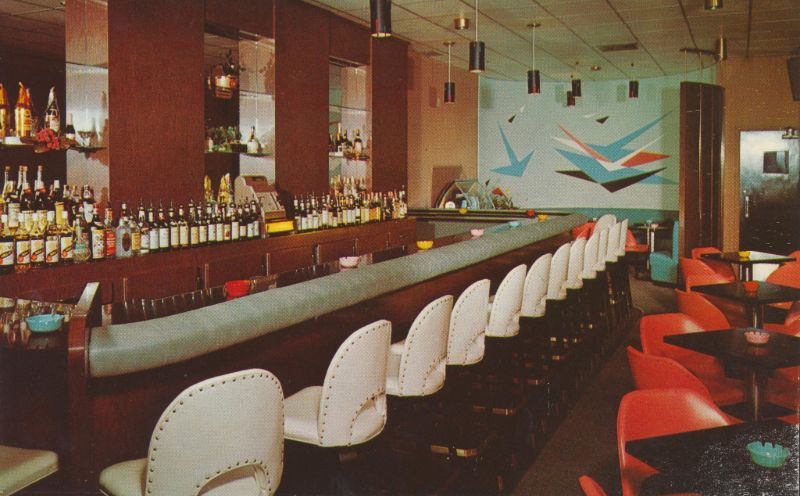
There was a thick cloud from the cigars, pipes, and cigarettes being smoked liberally, but the thickest of the gray-white smoke hovered along the high ceiling, swirling there lazily and disturbed here and there by invisible currents, so the air at head height and down was clearer. Silver dangling lights with golden accents hung from the ceiling over each table, and recessed lights in the ceiling and under the bar gave the place a golden, ethereal glow. A few faux potted trees stood along the back wall, which was half of glass and half of brick, and the glass portion revealed a view into the courtyard and pool area of the motor inn. The water in the pool glowed electric aquamarine from submerged lights. It was February and only a fool would go swimming, but for some reason the innkeepers left the pool open. Perhaps for this very view. A starburst clock of the popular space-age style was on the center of the brick section of the wall, and on the other there was colorful modern art hanging. I looked around and there was artwork displayed prominently around the lounge, and the most notable I saw from the front door was a large painting of stylized or maybe cartoonized television sets of assorted primary colors set against a sand-brown background. The rabbit-ear antennae of the tv sets emitted stylized lightning, symbolizing electricity, which connected each set with the other tv sets and with the background moon of a greenish yellow hue that looked like cheese gone moldy.
The tabletops were also variously colored, some red and some yellow and others a kind of aquamarine blue, and on each table and interspersed along the bar there were ashtrays, all unique—some of glass and some of ceramic.
I sat at the bar and there were small brass dishes with free cigarettes there, so I picked one and lit it from a book of paper matches emblazoned with a kind of black and white caricature of the front sign of the Vacation Motor Inn. There was a short tag line written on the inside flap:
You’re Someone in Nowhere!
Stay at our Vacation Inn, the Best Value Nowhere!
That had to be all Carol.
A bartender in a full tuxedo (black) took my drink order and I wondered where he’d gotten the black tuxedo, obviously not from Kenton’s, and whether he was lucky or cursed that he’d procured it without being mauled by Lucy Kenton the serial groper.
“Rum Runner,” I told the barman and took a drag on the cigarette deep into my lungs, exhaling slowly as I began to write some quick notes on bar napkins. Mostly of my conversation with Carol from the earlier tour. The drink arrived and I’d already filled five napkins with notes when I saw from the corner of my eye a man pull out the stool next to mine at the bar and sit down.
“John Lee Danner,” the man said, sticking out his hand. He was a handsome man, middle aged, thin, and medium height, dressed in slacks and a dress shirt with no tie and no jacket. I shook his hand.
“Ken Halberson.”
“Glad to know you, Ken.”
“Likewise.”
“You must be our writer fella, visiting from that Antichrist metropolis of
New York City.”
I laughed. “Schenectady, actually, but still New York.”
“Well, then… I’ve been misinformed. I do apologize to you, sir, but not to that Antichrist metropolis at all. New York City is a hive of mendacity unmatched since the days of Caesar Nero.”
I laughed and John Lee Danner smiled. He ordered a bourbon neat from the bartender and when it arrived, he tipped it to me as a sort of toast.
“Are you from New York City, John Lee? Is that why you dislike it so?”
“Oh heaven’s no. I don’t like to talk about myself, but I’m a Kentucky boy is all I’m willin’ to say. Born and bred.”
I nodded. “Thus, the bourbon.”
“Oh yes, sir.”
“Have you been introduced around to any of the locals, Ken Halberson?”
“I’ve met a few people. I met Lucy at the department store.”
John Lee laughed. “Oh Lord. You’ll need holy water. I hope she didn’t leave handprints. You better order something stronger than that lady’s drink there. Anyway, let’s peruse the situation right here at the Brick and perhaps I can fill in the blanks for your collection of bar naps. Don’t take any of my commentary seriously. I majored in gossip and fully half of what I’m going to tell you is one quarter true.”
We turned around on our stools and leaned against the bar. A trio of musicians had begun to set up on a small bandstand and unpacking instruments, each of them must have played several—a trumpet, an upright base, a trombone, and a banjo—then the bar man rolled a piano over to the bandstand as well. John Lee seemed to ignore the band.
“That delightful couple at the orange table… she’s in the simply stunning red frock and he’s nearly drunk already… they’re the Campbells. Marjorie and Don. Real Estate, but he also has a sideline of losing money to Leon McClain and everyone else at poker. Golf handicap in the neighborhood of 28 or so. Loses money on the golf course too. We have a breathtakingly beautiful course here, though it’s only nine holes. You play each hole twice from different tee boxes each time. I personally don’t play. Bad back. Don Campbell does have a delightful singing voice though. Marjorie bakes cakes that are in great demand at cocktail parties and socials and she umpires baseball games in a dress.
“That tall, dark man standing over by the clock is Cameron Baker. Insurance. Nice enough looking, but plain as tap water. You’ll need to punch up his character some in your story, or just leave him out altogether. Nobody will notice.
“Lester Mead is the gentleman in the blue blazer talking to that fetching woman in green, which is his wife, Nancy. Out in the other world I like to think Lester was a bank robber. Did some time at Angola after a bank guard got killed accidentally by a nervous getaway driver. In my imagination, Lester has cleaned up his act, as they say, and has not killed anyone or robbed our bank at all, yet, though the night is still young. His charming wife (and this part is factual) is the bank secretary for Mr. Copeland, which makes things interesting, her husband being a probable bank robber, and she does cross-stitch and drinks like a fish. Seriously. Don’t try to put her under the table in a drinking contest. You’ll die.”
I wrote rapidly on the napkins in shorthand and pushed them into the pockets of my sport coat but when John Lee paused for a sip of his bourbon I put down my pen to take another swallow of my ‘lady’s drink.’
Another couple walked into the bar and John Lee pointed with his drink hand. “Here comes Dennis Perez and his wife Candy. Puerto Rican on his father’s side and his wife is full-blood Tulsa, Oklahoma cracker. Folks don’t seem to mind that she’s an Okie. Dennis is the milkman but despite the bad reputation of that sort of employment, rumor has it that Dennis has fathered exactly zero of the children in town other than his own.”
I lit another cigarette. “You said ‘out in the other world.’ Would you like to elaborate?”
John Lee laughed. “Oh, you caught that? Well, it’s just a term I use for the world of things outside of Nowhere. That just sounds like bad English. But, you know… (he gestured wildly with his hands) out there.”
“Interesting,” I said. “We’ll pursue that in a moment. And what’s your calling, John Lee? If I was talking to another town gossip, what would he or she tell me about you?”
John Lee smiled, obviously enjoying the verbal tête-à-tête. “Well, I don’t like to talk about myself, as I said. In this world I’m just an idle retiree. I don’t rob banks or lose at poker. My handicap is that I do not play golf. On rare occasions I have been known to sing and engage in other frivolity.”
“And what is your theory of how Nowhere came to be?”
John Lee’s eyes lit up markedly. “Oh my! We do get straight to it, don’t we! You want to talk about that? Well, I suppose you’ve heard all the goldmine theories,” (he rolled his eyes,) “of which there are twelve or more versions and sub-versions of those versions, but none of those are true. You see, Nowhere isn’t there at all. Unless you mean in the metaphysical sense. It’s here, but it’s not there.” He beckoned at the bartender. “You’re going to need a better drink, Ken. Let’s get Paul here to pour you some Kentucky magic with a heavy hand on this one.”
***
The bourbon burned good and warmed Ken as it went down. John Lee nodded approval as Ken downed the first drink and immediately ordered another.
John Lee Danner’s Nowhere creation story was intriguing if only for its creativity. Danner would have made a good science fiction writer, Ken thought, if he could write.
John Lee believed, or so he said, that Nowhere existed on a completely different timeline—in a different plane of existence—than the outside world where they’d all lived before coming to the town.
“No one is from Nowhere,” John Lee said. “We’re all here visiting from the outside world.”
According to Danner, the first A-bomb exploded at the Trinity Site at the top of a 100-foot tower back in ’45 had caused a rip in the “spacetime continuum,” as he called it. John Lee believed the blast had created a portal.
“Not all such explosions do it, you must understand” John Lee said, “oh no, but this one did. It was the rare and unique situation, geographical and technological, of this area that caused it. You see, and this is all top secret, there are four huge space aerials—super antennae—located equidistant from this very location. Twenty miles out in the four cardinal directions. The government uses them to shoot messages into space. You know… trying to find outer space life. Martians, I suppose. Or to let Martians find us.”
Ken Halberson was intrigued. “Go on.”
“They don’t let anyone know they’re doing it. It’s super-high-level-ultra-top-secret. Yes, so when the blast from the A-bomb happened, it fused a lot of the sand into a green glass substance now known as ‘Trinitite’. Some of this glass formed on the surface of the ground in the blast crater. A lot of it formed into droplets of glass in the air as the sand that was sucked upward from the explosion in the mushroom cloud was superheated. Those glass droplets rained down from upwards of seven miles up in the sky. So, we had an accidental ‘perfect storm’ of a radiological wall of superheated glass blowing outward, upward, then downward toward an area that just happened to be surrounded by four mega space antennas! Somehow the power and electrical force of the blast supercharged the Trinitite between the four antennas and zapped this little piece of sacred ground, the future location of our blessed village… well… it moved that square of desert here.”
Halberson pointed at the painting on the wall. The one with the stylized television sets with the electrical lightning bouncing between the antennas.
“Kinda like that?”
Danner smiled. “Exactly!”
“Did you paint that painting?”
“I do hope you enjoy my work. I don’t like to talk about myself.”
We were several drinks in now and feeling good. After the third drink apiece John Lee instructed the barman, Paul, to leave the bottle.
“The town was started when a couple of government guys figured out the anomaly that’d been caused by the bomb,” John Lee said. “They located this area in the desert where compasses didn’t respond correctly to movements. Then they did some testing. Eventually they discovered what had happened and they realized they had a gold mine, so to speak. That’s where the gold mine rumors really came from. They started the town and figured out how to ferry people, goods, and equipment here.”
“Who were these men?” Ken asked.
John Lee took a swig of his whiskey then stared at the nearly empty glass. “Well, I can’t rightly say. But Copeland is one of them, I bet.”
Ken grabbed the bottle and poured another round.
“As a writer I can appreciate the effort that went into this theory. It would make a good book. But you don’t actually believe it, do you?”
“If you think about it,” John Lee said, “it explains almost everything… like why it’s such a difficulty to get here, to even find this place. Why you can’t get here from anywhere on a tank of gas. Why you must be brought here by someone else who knows that to get here all the way you must stop just far enough out and put some special gas in the tanks… a gasoline that has Trinitite in it, and why no one in the other world even knows this town exists. It’s like in that Broadway play Brigadoon, only this town doesn’t go to sleep every night and stay asleep for a hundred years. They’re coming out with a movie about Brigadoon. Supposed to have Gene Kelly in it and it should be fabulous, but we won’t be able to get the film here for two years or so. Anyway, admit it. When you first started looking for this place, no one knew where to find it, right? It’s not on the maps. Does that seem normal? They say this town doesn’t even show up on aerial photos. Well… now you know why.”
Ken downed his bourbon. “I asked you a question, though. Do you believe it?”
John Lee laughed. “Of course not.”
“So, what’s your issue with New York City?”
“I don’t like to talk about myself.”
***
After some more small talk, John Lee Danner excused himself and said he had to leave. He had a date, he said, with a Cocker Spaniel. After he left, I kept writing notes for maybe a half hour, and I was really starting to feel the effect of the alcohol. I looked up and I saw Leon McClain sitting by himself at the other end of the bar, so I joined him.
“How was the tour?” Leon asked.
“Carol was a wonderful tour guide and tell her I appreciate it. I told her so myself, but make sure she knows it,” I said. “Of course, I’ll want to spend more time exploring, but she did give me a good idea of how everything is laid out. She said there were quite a few bars and cocktail lounges downtown. I might need to get a car.”
“We also have a nice little walkable bistro and bar area on Chestnut with outside covered seating that can make for a good night of bar hopping, like in The Sun Also Rises. I recommend it, though you might want to take a friend or two with you at first. Not because it is at all dangerous. It isn’t. But until you get to know more people around town it can make having fun more fun. I don’t know, maybe you’re the type that doesn’t mind going out alone and who makes friends easily. If you want, Carol and I’d love to go with you. Or, I saw you down here talking with John Lee. I’m sure he’d like a night downtown, though I do need to inform you, not that it’s a problem at all, but I think John Lee is a homosexual and my only concern is that if you are looking for, you know… female companionship… that such a pursuit might be hindered if the ladies think you’re on a date with a man. I mean, I’m not the kind of person that has an opinion one way or another about how another person lives their life. It’s just not my thing, and I assumed it’s not yours either.”
I shook my head a little, not sure what I’d heard. “Wait. You’re not a homosexual?”
“Me? Of course not. Don’t be ridiculous. I love women. I’m in love with a woman.”
“I think we have a lot to discuss.”
“Later. First tell me what you and John Lee chatted about. I’m sure it’ll be worth hearing.”
I lit a cigarette and poured a shot of John Lee’s bourbon into my glass and offered one to Leon which he turned down. He was drinking a glass of red wine. The band started playing softly, a version of When Did You Leave Heaven.
As we each took a drink from our glasses and I a draw from my cigarette, a waiter came by with a rolling cart with several trays of hors d’oeuvres. Oysters, salted and open-faced on silver trays with ice, another tray with meatballs covered in some creamy sauce with toothpicks, and glasses of seafood cocktails. On a second level of trays there were deviled eggs, sprinkled with paprika and what looked like ground dill or basil, little bacon wrapped sausages, and a nice bowl of creamy salmon dip with crackers. There were plates and patrons filled their plates as the waiter took drink orders. I got it. The food was free, but the prices for drinks went up when the band started. Good business, and the people obviously liked it.
After we each filled a plate with some food selections, I went back to Leon’s question. “You asked what we talked about. Well, Mr. Danner gave me a rundown of most of the characters currently in this cocktail lounge, or at least his opinion of them, and then he told me his theory of the genesis of the town of Nowhere, New Mexico.”
“Wow. You boys were indeed drinking. Usually, it takes a couple of outings before John Lee will throw out his craziest ideas.”
“I might have coaxed him,” I said.
“Did he tell you that Nowhere come down from outer space, or that the A-bomb turned everything into green glass and blasted us into another plane of existence using Martian radio antennas?’
“The second one, but I can’t wait to hear the first.”
“You’ll hear it soon enough. He’s not the only one that believes that one,” Leon said.
“He also told me he really didn’t believe the A-bomb theory.”
“Of course he said that! He can’t have you thinking he’s crazy. At least not yet.”
I laughed. “He’s a nice enough guy. Very entertaining. So… He has the dope on everyone else. What’s his story?”
“He’ll tell you he doesn’t like talking about himself, and he really doesn’t.”
I was writing on napkins again, which seemed at first to be disconcerting to Leon McClain, but he said nothing of it.
“First, John Lee Danner is not his real name. He adopted that name once he got here, and I’m not at liberty to tell you his real name.”
Now he had my attention. “A mystery? Fantastic.”
“It’s not much of a mystery. He was a famous singer throughout the 1940s. He was 4F in the war because he had vision problems. He really wanted to go over there, but they wouldn’t let him. Broke his heart. Usually, they’ll let a famous singer go in just as an entertainer, you know, to entertain the troops. But John Lee also had a back injury that precluded him from service.”
“How do you know?” I said. “I mean, he seems a little fast and loose with the truth.”
“He doesn’t lie out of malevolence. He’s a storyteller who has this outlet of telling stories. Anyway, he tells you when he’s lying, which is admirable. And he likes you very much. He stopped by after he left you and you were still scribbling on your bar napkins, and he said as much. He said, “I really like that fellow Halberson. He’s a great writer, and I know it because only great writers take notes on beverage napkins, and he doesn’t interrupt a man when he’s telling a story except to write on his napkins, which means he can listen. See? He likes you.”
“I like him too.”
“Oh, John Lee is great. But I know this part—the part about him being 4F—is true for certain because we all got drunk at his little apartment on 8th and Southwest one night and he showed me his wartime papers.”
I looked impressed, or I tried to. I was quite drunk at this point. “You said he was a famous singer How famous?”
“He took over from Sinatra with Tommy Dorsey for a brief time and had his own band for several years. Made records. Played Carnegie Hall. Had a hate-hate relationship with Tin Pan Alley—thus the hatred of New York City to this day. That was in the peak of the radio years, and he was much in demand. He got out of it before the television really came along. Said he had to quit or he’d die. I never asked him why.”
“Do we know all that part is true?” I asked.
“We do. If you ever heard him sing, you’d place him immediately. You know him, just not as John Lee Danner. That’s why he rarely sings. I figured it out when we were at his apartment and he was drunk and he showed us his record collection. He had several of his own recordings in there. I recognized him right off.”
“I never would have guessed.”
The music picked up now, after the food, and the drinks were flowing and couples moved out onto the dance floor. Several more musicians had joined the band. There was a clarinet player now and a saxophone. The band went into AC-CENT-TCHU-ATE THE POSITIVE and the dance floor came alive.
“The music seems to be a lot from the forties,” I said.
“That’s really the way it goes around here,” Leon nodded. “It’s not that there isn’t any rock-and-roll, but we’re probably behind the times. There are some practical reasons for that. Not much television here, and we’re really off the beaten path. Children still spend time with their parents. They listen to what their parents listened to. And there’s not much rock-and-roll on the radio here. I’m sure the kids have a record player and they’re listening to some of the new stuff, but I don’t think it’s anywhere near what it’s like in the rest of the world.”
The band went into It’s Been a Long, Long Time and as the music started, I looked up and a beautiful girl had taken a microphone and started singing. She was wearing pants, feminine and high waisted, a deep, dark green swirled or splashed with black. The pants went down to just below the calf leaving the ankle and foot exposed, and she wore some off-white sandals with a two inch heel. She was short, thin, but had a fine figure. Her blouse was white, short to the elbows and collared. Her hair was quite blonde and pulled up in a ponytail, and she sang like an angel. The trumpet player was every bit as good as Harry James, but I didn’t care. I was smitten with the girl.
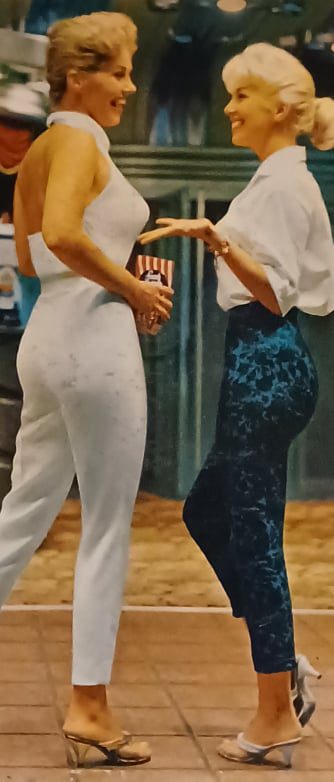
After the song and a nice round of applause, the girl and another girlfriend made their way through the crowd toward our end of the bar. The second girl was pretty too. More full-figured, but very nicely dressed in aqua-marine pants and a white, backless top. She was blonde too, but not as blonde and she was taller.
As far as I was concerned, there was only one of the two that interested me.
“Very nice,” Leon McClain said to the girls. “I didn’t expect that. You must have worked it out with the band beforehand.”
The first girl, the one who sang and who looked like every good dream I’d ever had, took Leon’s outstretched hand. “Carol asked me to. I hope you don’t mind.”
“Mind? I loved it. That was a beautiful job and thank you. Where are you girls headed?”
“We’re out to the Bijou. The Quiet Man has finally made it to town,” the second girl said.
“I love John Wayne,” Leon said. “Oh, by the way, this is Ken Halberson.
He’s a New York Writer of some note. Here to destroy the town.”
“Oh, really?” my girl said. “It’s nice to know you, despite your nefarious intentions.”
“I have no—”
“Are you girls on dates tonight?” Leon said.
The second girl laughed. “Leon, you know there aren’t any available men in this town!” Her eyes cut to me as she said it, then she looked down.
“Maybe you two strong, strapping men would like to take us,” the first girl said.
The tall girl squealed and laughed. “You’re wicked! You know Carol will murder us if we move in on Leon!”
“We’re not moving in on anyone, Samantha! She’s busy calling Bingo at the VFW and you just know she knows we’d never try to steal Leon!”
“Well,” Leon said. “I think I’m flattered. Or not. I can’t decide, but I simply must stay to close this place down and clean up all the oyster shells. But you should take Mr. Halberson. I’m sure he’d like the fodder for his book or his article or whatever destructive device he has planned for Nowhere.”
“You sing beautifully. Like a nightingale,” I said, “or a siren.”
“The kind on a police car, or the kind that lures men to their deaths?”
“The nightingale, then,” I said.
She laughed. “Well, what say you, Mr. Halberson? To the movie, I mean.”
“I… I couldn’t. I’m really quite drunk by now.”
“Oh nonsense,” Samantha said. “You’re fine. If that’s drunk, you’ll fit right perfectly in Nowhere.”
The first girl put her hand on Samantha’s arm. “If he says he can’t, Sam, he can’t.”
“I’m sorry,” I said. “I’d love a rain check.” I pulled dozens of bar napkins full of notes out of my pocket and dumped them on the bar. “I have notes to transcribe.”
My girl smiled. “Oh my. The writer’s version of ‘I’m washing my hair.’ Well, enjoy that. But as to a rain check, we’ll see.” Then she winked as she took Samantha’s arm, and they sailed smoothly out of the bar.
Regret flooded over me like the lingering scent of her perfume. Lilacs and strawberries forever. I slammed the last of John Lee Danner’s bourbon.
“Shit,” I said under my breath as the door closed behind them. “I didn’t get your name.”
“Kate Laird,” Leon McClain said, cracking his knuckles. “That was Kate Laird.”
Downloads
PDF Version
Mobi Version
ePub Version

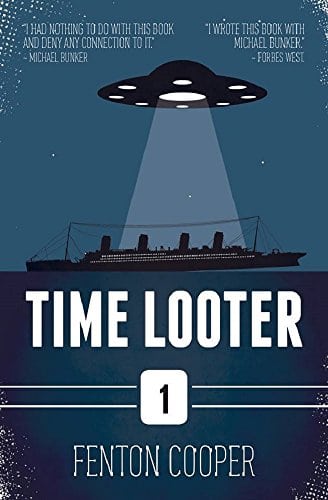
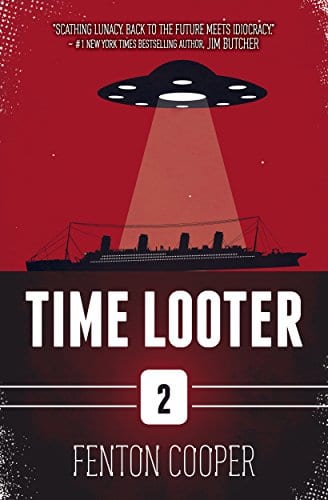
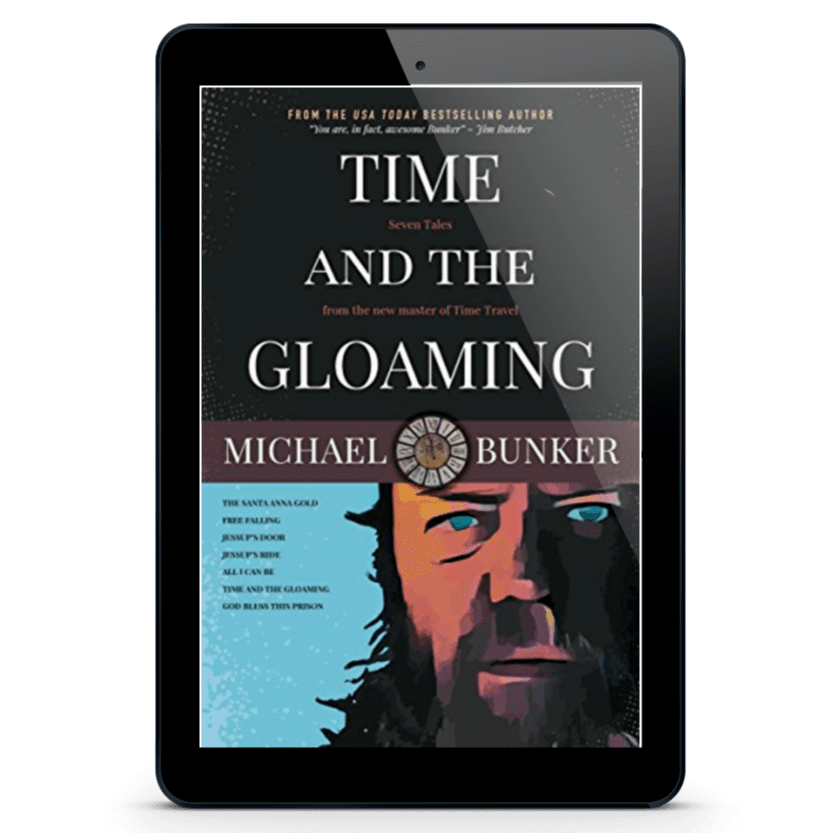
Just wondering if the pictures you are adding to the story came from the suitcase or if they’re just internet finds.